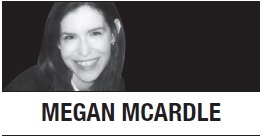
Emmanuel Macron was the “can’t lose” candidate in the French presidential election. Impeccably well-credentialed. Handsome and sharp. Running against a far-right populist who spurs frightened talk of fascism. The polls showed him comfortably ahead, said the analysts. There was little chance that his opponent, Marine Le Pen of the National Front, could close such an enormous gap.
“Where have we heard that before?” muttered Americans.
As Election Day waned on on Sunday, slight traces of nervousness could be observed. Voter turnout was down from previous second-round elections, a circumstance that was thought to favor Le Pen. Brexit …. Trump … could Le Pen be about to add her name to the litany of nasty surprises for the globe’s cosmopolitan ruling class?
Yeah, no. By 8 p.m., Paris time, Macron had been projected the landslide winner, with early returns showing him sweeping into office with roughly two-thirds of the vote. History may repeat itself. But the question is always “Which bit of history?” In the past few years, old establishments have been swept out by populist movements complaining that long rule had made them far too comfortable in their positions, too little responsive to the ordinary people who kept putting them in office. Well, this time around, a clear majority of those ordinary folks have opted for continuity with that past, rather than a radical break from it.
On Saturday, I asked Arun Kapil, a political scientist, to run down the implications of various vote tallies Le Pen might get. He broke it down for me thus:
- 45 percent of the vote: “An earthquake”
- 40 percent of the vote: “Very good for her”
- High 30s: “Good, about what she’s expecting”
- Low 30s: “A disappointment”
Under 30 percent, he said, she would lose control of the party her father founded.
It looks like Le Pen will get about 35 percent, the electoral equivalent of “meh.” On the one hand, this is a very good result for the National Front, which has long struggled to get political representation in line with the percentage of the population that supports them. France’s two-round elections make it hard for them to win seats in the legislature, much less the presidency, because even if they make it into the second round, all the other parties gang up to deny them a win. The last time the National Front was in the second-round presidential election, in 2002, Le Pen’s father collected only 17.7 percent of the vote. Marine Le Pen has doubled that.
In part, that’s because neither the parties nor the voters mounted as fierce an effort to hold down her vote totals. Francois Fillon, the mainstream conservative candidate, immediately urged his supporters to turn out and vote for Macron. But Jean-Luc Melenchon, the far left candidate who outperformed the stalwart old-guard left of the Socialist Party, was not so supportive. And voters, apparently almost as sick of politics-as-usual as they are afraid of Le Pen, often decided to stay home rather than turn out to vote “Anyone but Le Pen.”
But if this is not a terrible result for the National Front, neither is it terribly exciting for them, no matter how hard they try to spin it into a moral victory. Getting a third of the vote is all very well, but France’s system is structured to require a clear majority. In a dispirited year, when populist waves seem to be advancing everywhere, two-thirds of voters rejected the party‘s politics in favor of an upstart no one had heard of a couple of years ago. Perhaps they are on an upswing that will deliver them the presidency five years hence. But then, perhaps they have a cap that will forever keep them distant from power -- close enough to see the presidency in reach, but never to reach it.
That does not, however, mean that politics-as-usual can simply keep on keeping on. For one thing, Macron’s En Marche party still faces legislative elections in June. If it cannot get a legislative majority it will enter “La Cohabitation,” an uneasy alliance with another party that will weaken the position Macron has just won. And while France tends to deliver its presidents legislative majorities to go along with their new office, a brand-new party like this one is not as well positioned as the old standbys to take the majority that Macron will need to govern as he wants.
The deeper issue is the fact that French voters were forced into the position of voting for a far-right nationalist or “God no, not that!”
Depressed turnout and record support for the National Front suggest that something real has happened in French politics, something that should worry the establishment. Even if the party never makes it to the presidency, it may be able to play spoiler in future second rounds, effectively forcing the choice of president back to the first round of the elections.
But it seems very possible that presidents who make it into office that way could find themselves without the political capital that comes from winning an election because a majority of voters wanted you, or at least, wanted your side of the political spectrum. Those who gain office simply by being somewhat less horrifying than the alternative may find it hard to amass the popular support, and legislative majorities, they need to get anything done. Becoming the “can‘t lose” candidate could thus very easily turn out to be a no-win proposition.
By Megan McArdle
Megan McArdle is a Bloomberg View columnist. -- Ed.
(Bloomberg)







![[From the Scene] At this Starbucks, you need ID: Franchise opens store with view of North Korea](http://res.heraldm.com/phpwas/restmb_idxmake.php?idx=644&simg=/content/image/2024/11/29/20241129050068_0.jpg)
